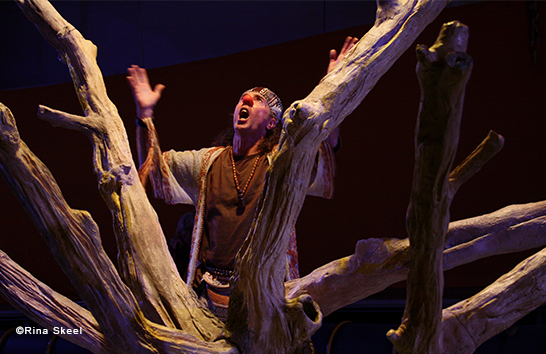Denmark
Odin Teatret
Directed by Eugenio Barba
WHEN:
October 25, 2019, 20:00
October 26, 2019, 20:00
October 27, 2019, 20:00
WHERE: Woodcarving Hall
Duration: 80 minutes (without intermission)
Performed in Danish, Italian, English, Bengali and Balinese, with subtitles

Reviews
The Tree is, after The Chronic Life and Great Cities under the Moon, the third chapter of a "The Trilogy of the Innocents" by Odin: another fresco on broken promises and hopes, a painful look at the history of humanity, which begins with the tenderness of a child and her dreams and reaches the cruelty of the warlords. The Tree is one of the more modest and linear performances in the history of Odin, a true poetry on death and innocence.
- Andrea Porcheddu, Odin Teatret: A Tree with Strong Roots
This, the third stage of the" Trilogy of the Innocent, " after The Chronic Life and Great Cities under the Moon, looks across our world, with eyes that do not look away from pain, conformism, consumerism, suffering and renunciation but cultivate the dream, even in the gray landscape of a nightmare.
- Massimo Marino, The Dry Tree, The War, The Birds

About The Tree
The tree of History grows vigorously and dies. Around it, child soldiers and praying monks dance together with warlords, a wrathful mother, and the daughter of a poet who, as a child, dreamed of flying away with her father.
Two story-tellers introduce and comment upon characters and events: in the Syrian desert two Yazidi monks plant a pear tree to call back the birds that have disappeared; in Nigeria a mother rests under the shadow of the tree of forgetfulness holding in her arms the head of her daughter hidden in a gourd; a European warlord explains the necessity for ethnic cleansing to an African warlord who performs a human sacrifice to make his army of child soldiers invulnerable before leading them into battle; a girl plays with her dolls around the tree her father planted when she was born, wondering how birds see the earth from the air.
The tree of History finally bends under the weight of fruit and offers a home to the birds that are flying over the heads of the spectators. But what kind of birds are they?

Credits
Director: Eugenio Barba
Performers:
Luis Alonso - Yazidi monk
Donald Kitt - Yazidi monk
Julia Varley - Yazidi monk
Kai Bredholt - European warlord
I Wayan Bawa - African warlord
Roberta Carreri - Igbo woman
Iben Nagel Rasmussen - A poet's daughter
Carolina Pizarro - A poet's daughter as a young girl
Parvathy Baul - Storyteller
Elena Floris - Storyteller
Fausto Pro - Deus ex machina
Scenic Space: Luca Ruzza, Odin Teatret
Lighting Designer: Lucca Ruzza, OpenLab Company
Lighting Adviser: Jesper Kongshaug
Tree Conception and Realisation: Giovanna Amoroso and Istvan Zimmermann, Plastikart
Software Programming: Massimo Zomparelli
Costumes and Props: Odin Teatret
Poster: Barbara Kaczmarek
Musical Director: Elena Floris
Technical Director: Fausto Pro
Puppets: Niels Kristian Brinth, Fabio Butera, Samir Muhamad, I Gusti Made Lod
Dolls' Heads: Signe Herlevsen
Photos: Rina Skeel
Dramaturg: Thomas Bredsdorff
Literary Adviser: Nando Taviani
Text: Odin Teatret
Assistant Directors: Elena Floris, Julia Varley

About Eugenio Barba
Eugenio Barba (Italy, 1936) founded Odin Teatret in 1964 in Oslo and moved with it to Holstebro, Denmark, in 1966. He has directed 77 productions. He founded ISTA, the International School of Theatre Anthropology, in 1979. Of the books he has published, the following have been translated into English: The Paper Canoe, A Guide to Theatre Anthropology (Routledge 1995), Theatre. Solitude, Craft, Revolt (Black Mountain Press 1999), Land of Ashes and Diamonds: My Apprenticeship in Poland, followed by 26 Letters from Jerzy Grotowski to Eugenio Barba (Black Mountain Press 1999), On Dramaturgy and Directing: Burning the House (Routledge 2010), The Moon Rises from the Ganges. My Journey through Asian Acting Techniques (Icarus 2016) and in collaboration with Nicola Savarese, The Secret Art of the Performer (CPR/Routledge 1991) and The Five Continents of Theatre: Facts and Legends of the Material Culture of the Actor (Brill/Sense 2018). He has received numerous international awards and honorary doctorates.

About Odin Teatret
Odin Teatret was created in Oslo, Norway, in 1964, and moved to Holstebro (Denmark) in 1966, changing its name to Nordisk Teaterlaboratorium - Odin Teatret. Odin Teatret has so far created 77 performances, performed in 66 countries and different social contexts. Today, its 40 members come from eleven countries and four continents.
Nordisk Teaterlaboratorium - Odin Teatret's activities include: Odin's own productions presented on site and on tour in Denmark and abroad; "bartering" with various milieus in Holstebro and elsewhere; organising encounters for theatre groups; hosting other theatre groups and ensembles; teaching activity in Denmark and abroad; the annual Odin Week Festival; publication of magazines and books; production of didactic films and videos; research into theatre anthropology during the sessions of ISTA (the International School of Theatre Anthropology); periodic performances with the multicultural Theatrum Mundi Ensemble; collaboration with the CTLS, Centre for Theatre Laboratory Studies of the University of ?rhus; the Festuge (Festive Week) in Holstebro; the triennial festival Transit devoted to women in theatre; OTA, the living archives of Odin Teatret's memory; artists in residence; co-productions; children's performances, exhibitions, concerts, round tables, cultural initiatives, transformative processes and community work in Holstebro and the surrounding region.
Odin Teatret's 55 years as a laboratory have resulted in the growth of a professional and scholarly milieu characterised by cross-disciplinary endeavours and international collaboration. Under the name of Nordisk Teaterlaboratorium, younger artists and groups that are closely connected to Odin Teatret's history and experience develop their artistic autonomy in the form of residencies, co-productions and local activities.






